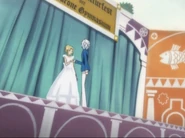Prologue[]
Once upon a time, there was a girl who loved flowers more than anyone. She prayed every day for the whole town to be filled with beautiful flowers. To make that happen, she pulled up all the town's ugly weeds. Eventually, the girl's prayers were answered and the town was blanketed in flowers. But they say the town that was filled with innumerable blossoms of every color imaginable somehow looked gray.
Story[]
Ahiru tries to speak to Rue in the girls' dorm but there is no answer at her door even though she came back to school and Ahiru still has yet to find out what happened to Mytho. The next day at school, Mytho appears carrying an injured Rue in his arms. Mr. Cat then announces the winner of the upcoming ballet competition will take the place of Rue who cannot dance and become Mytho’s partner for the exhibition. Ahiru chases after them to find Rue was pretending to be hurt and that her bandaged leg is fine and the two then disappear before Ahiru can hear any more.
Ahiru then comes across a beautiful girl called Freya who is watering flowers which she loves. Upon walking back she comes across a little girl who asks where her duck tail is and pulls at her underwear to Ahiru’s panic who cries “quack” and turns into a duck. Running away, she turns back into a girl and the girl who was watching leaves.
Meanwhile, Mytho comes across a practicing Freya and as Ahiru passes by their room she overhears him as he trances her as he did with Pike. Turning into Princess Tutu, she interrupts the two in the room only to find the room engulfed with flowers. Dancing, she tries to heal both Mytho and Freya however Mytho is taken in a flurry of black feathers leaving Princess Tutu and Freya in the room alone. The ballet competition is starting and all the girls perform their dances. Ahiru meanwhile goes to see Fakir only to meet the young girl from before who seems to know Fakir who appears. When Ahiru turns into a duck in panic, the girl brings water to turn her into a girl causing a flustered Fakir to hide behind a corner due to her nakedness.
Later the two sit down inside and the girl is introduced as Uzura who was made from Edel's embers by Karon, Fakir has told Uzura of everything so far since she retains no memories of Edel. Ahiru then tells Fakir of Mytho trying to take the hearts of people and recalling his conversation with Princess Kraehe, Fakir decides to remain silent to avoid her suffering. Ahiru leaves with Fakir tagging along and the two return to the competition.
Freya performs her dance and is assigned as the winner, Fakir and Ahiru go after the two of them where Mytho once again tries to take Freya’s heart. Princess Tutu and Fakir go forth and stop Freya’s heart from becoming a sacrifice for the Raven but before they can go to Mytho, Princess Kraehe appears and tells Princess Tutu how she made Mytho how he is by returning the shard.
Gallery[]
Trivia[]
- Subtitle: Gebet einer Jungfrau
- Crow victim: Freya
- Freya was the Norse goddess of love, beauty, and fertility, and also helped with bringing spring.
- Freya dances the same dance as the one Rue did in Akt 4, but she's having an easier time of it than Rue did.
- First appearance of Uzura.
- The wheels of Drosselmeyer's clock have petals in this Akt.
Music[]
- Tchaikovsky, Piotr Ilyich: Sleeping Beauty Act III – “Puss in Boots & The White Cat”
- Wagner, Richard: Gotterdämerung: Music from Act III, Scene 2 - “Siegfried’s Death March”
- Mendelssohn, Felix Bartholdy: On Wings of Song
- Mussorgsky, Modest (orch. Ravel): Pictures at an Exhibition: Dance of the Unhatched Chicks
- Adam, Adolphe: Giselle Act I, No.3 – “Entrance of Giselle” (rehearsal reduction)
- Vieuxtemps, Henri: Reverie, Op.22 no.3
- Offenbach, Jacques: Orpheus in the Underworld: Act I – Overture
- Tchaikovsky, Piotr Ilyich: Swan Lake: Act II, No.13 – Andante non troppo “Dance de cygnes”
- Saint-Saëns, Camille: Carnival of the Animals: Hens and Roosters
- Offenbach, Jacques: Orpheus in the Underworld: Act I – Overture
- Løvenskiold, Herman: La Sylphide: Act II, No.8 – Finale
- Badarzewska, Tekla: The Maiden’s Prayer, Op.4



